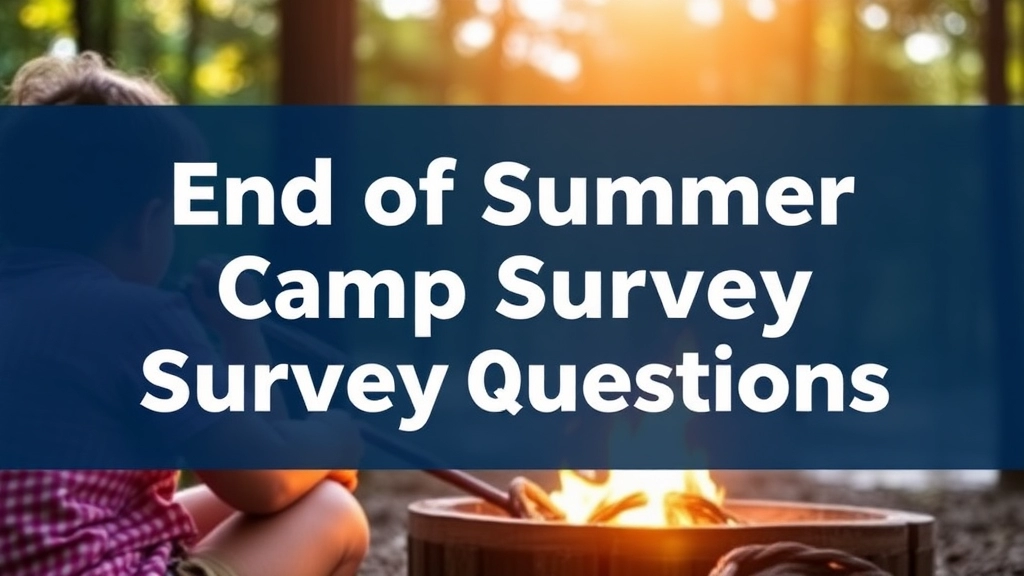End-of-Summer Camp Survey
As the summer sun sets and the campfires dwindle, it’s time to reflect on the camp experience with an end-of-summer camp survey. This article delves into the essential questions and methods to assess various aspects of the camp, from activities and staff performance to facilities and camper satisfaction. Gathering comprehensive feedback ensures that camps can continually improve and provide unforgettable experiences for all attendees.
Evaluating Camp Activities
We’ll explore how to evaluate camp activities, measure camper enjoyment, and gather insights on staff and leadership. We’ll also discuss the importance of understanding camper social interactions, collecting suggestions for future improvements, and analyzing the overall impact of the camp experience.
Key Areas of Focus
- Staff Training Opportunities
- Camper Retention
- Recommendations for Future Camps
By focusing on these areas, camps can identify opportunities for staff training and gauge interest in returning or recommending the camp. Let’s dive in and discover how to make next summer even better!
Key Questions to Assess Camp Experience
Alright, let’s dive right in. When it comes to figuring out if a camp experience was worth it, there are some crucial questions you need to ask. No fluff, just straight to the point. Here’s what you need to know:
Did You Have Fun?
First and foremost, was the camp enjoyable? Fun is the cornerstone of any camp experience. If the campers didn’t have a blast, nothing else really matters. Ask them:
- What was the most fun activity you did?
- Was there any part of the camp that you found boring or unenjoyable?
- Would you come back just for the fun of it?
Did You Learn Something New?
Camps are not just about fun; they should be educational too. Whether it’s learning a new skill or picking up some valuable life lessons, education is key. Questions to consider:
- What new skills or knowledge did you gain?
- Did you feel challenged in a good way?
- Was there a particular activity or workshop that stood out in terms of learning?
How Were the Camp Staff?
The staff can make or break a camp experience. Their attitude, expertise, and approachability are crucial. Ask:
- Were the staff friendly and helpful?
- Did you feel supported and safe?
- Was there a staff member who made a significant impact on your experience?
How Were the Facilities?
The state of the camp facilities can significantly affect the overall experience. Cleanliness, safety, and accessibility are non-negotiable. Questions to ask:
- Were the facilities clean and well-maintained?
- Did you have everything you needed?
- Were there any issues with the accommodations?
Did You Make New Friends?
Social interactions are a huge part of camp life. Building friendships can enhance the experience and create lasting memories. Consider asking:
- Did you make new friends?
- How easy was it to socialise and meet new people?
- Were there any group activities that helped you bond with others?
Would You Recommend the Camp?
This is the ultimate litmus test. If campers are willing to recommend the camp to others, you’re doing something right. Ask:
- Would you recommend this camp to a friend?
- What would you tell them about your experience?
- Are you planning to return next year?
Real Talk
Imagine sitting down for a coffee with a mate who’s just come back from camp. You wouldn’t bombard them with jargon or fluff. You’d get straight to the point, right? That’s what this is about. Real questions, real answers. Keep it simple, keep it real, and most importantly, make sure you’re getting the insights that matter.
By asking these key questions, you’ll get a comprehensive understanding of the camp experience from multiple angles. It’s not just about ticking boxes; it’s about genuinely understanding what worked, what didn’t, and how you can make it better next time. So, don’t hold back. Dive deep, ask the right questions, and use the feedback to create an even better camp experience in the future.
If you’re looking for specific camps that focus on fun and safety, consider checking out the Widefield Summer Camp or the Top Volleyball Summer Camps in the USA for some great options.
Evaluating Camp Activities and Programs
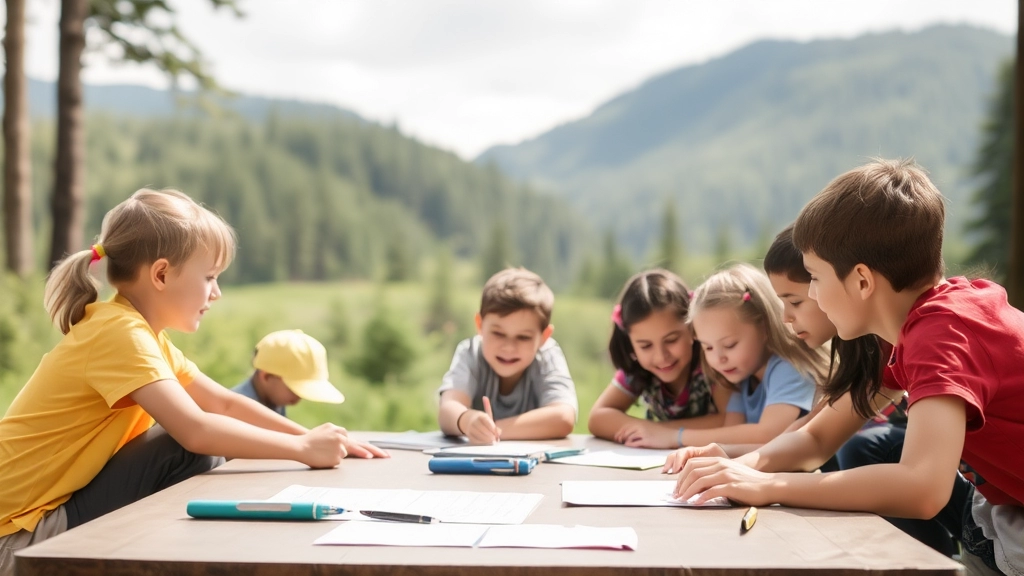
Alright, let’s dive into what really matters when it comes to camp activities and programs.
Are the activities engaging?
That’s the big question, isn’t it? If the kids aren’t having fun, what’s the point?
Here’s how we break it down:
Variety is key.
- Sports: Football, basketball, swimming. Are they covered?
- Arts and Crafts: Painting, pottery, DIY projects. Are the creative juices flowing?
- Adventure Activities: Hiking, zip-lining, canoeing. Are they getting their adrenaline fix?
Skill-building opportunities.
Are the activities just for fun, or are they teaching something valuable?
- Leadership Skills: Are there team-building exercises?
- Problem-Solving: Any escape rooms or puzzle challenges?
- Creativity: Do the arts and crafts push boundaries?
Age-appropriate activities.
No one wants to see a 5-year-old struggle with a high ropes course meant for teens.
- Age Groups: Are the activities tailored for different age groups?
- Skill Levels: Are there beginner, intermediate, and advanced options?
Frequency and duration.
How often are these activities happening, and for how long?
- Daily Schedule: Is there a balanced mix of activities each day?
- Duration: Are the activities long enough to be engaging but short enough to keep attention?
Feedback from campers.
What do the kids actually think?
- Surveys: Are there regular feedback forms?
- Focus Groups: Are there discussions where kids can voice their opinions?
Real stories.
Remember that time when little Timmy conquered his fear of heights on the climbing wall?
Or when Sarah discovered her love for painting during arts and crafts?
These stories aren’t just heartwarming; they’re proof that the activities are making an impact.
Keeping it fresh.
Are the programs evolving, or are they stuck in the past?
- New Additions: Are there new activities introduced each year?
- Trends: Are they keeping up with what’s popular among kids today?
Measuring Camper Satisfaction and Enjoyment
Alright, let’s get straight to it. Camper satisfaction and enjoymentâthis is the heart and soul of any camp experience. If the kids aren’t having a blast, what’s the point, right? So, how do we actually measure this?
Real Questions, Real Concerns
Parents and camp organisers often worry: Is my child really enjoying their time at camp? Are they making friends? Are they engaged in the activities? These are valid concerns, and we need to address them head-on.
Key Metrics to Measure Satisfaction
To keep it simple and actionable, here’s what we need to focus on:
- Daily Feedback: Quick surveys or smiley face charts at the end of each day. Kids can rate their day, and we can spot trends.
- Activity Participation: Track which activities are hits and which ones flop. If a kid is consistently skipping certain events, that’s a red flag.
- Behavioural Observations: Camp counsellors should keep an eye on the kids’ enthusiasm levels. Are they excited or dragging their feet?
Let’s Get Specific
-
Surveys and Questionnaires
- Use short, easy-to-understand questions.
- Include a mix of multiple-choice and open-ended questions.
- Example: “What was your favourite part of today?” vs. “Rate today’s activities from 1-5.”
-
One-on-One Check-ins
- Have counsellors do quick, casual check-ins with each camper.
- Ask open-ended questions like, “How’s camp going for you?” or “Made any new friends?”
-
Parental Feedback
- Post-camp surveys for parents to gauge their child’s feedback.
- Ask about changes in their child’s mood and behaviour post-camp.
Real-World Example
Imagine this: Little Timmy comes home from camp, and his parents notice he’s more confident and talks non-stop about the new friends he made. They fill out a post-camp survey, mentioning Timmy’s newfound love for archery. This feedback loop is gold. It tells us that not only did Timmy enjoy camp, but it also highlights which activities are hitting the mark.
Keeping it Fresh and Engaging
We can’t just rely on the same old methods. Mix it up:
- Interactive Feedback: Use fun, interactive tools like digital tablets for surveys.
- Campfire Chats: Informal evening sessions where kids can share their highs and lows of the day.
- Visual Boards: A board where kids can post sticky notes about their favourite moments.
At the end of the day, measuring camper satisfaction and enjoyment isn’t just about numbers and charts. It’s about understanding the kids’ experiences, learning from their feedback, and continually improving. For example, implementing ideas from summer camp culture and traditions can add a unique touch to your camp. If we nail this, everything else falls into place. So, let’s keep it real, keep it fresh, and keep those kids smiling. For more ideas on enhancing camper experiences, check out these creative summer camp themes.
Gathering Feedback on Camp Staff and Leadership
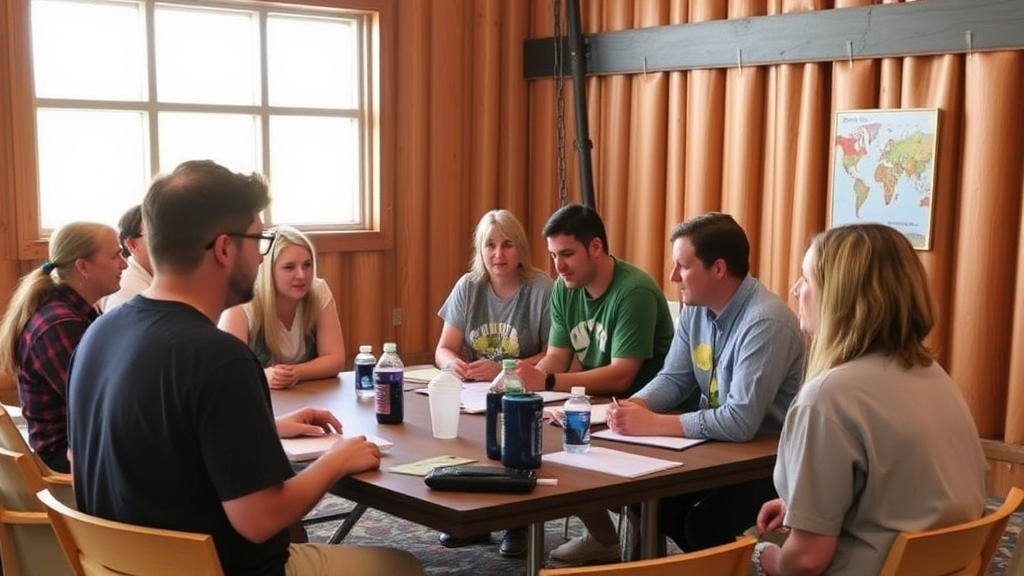
Alright, let’s get real. We’re talking about camp staff and leadership. You know, the backbone of any camp experience. So, how do we gather feedback on these folks?
Why Feedback Matters
First off, why should we care? Because the staff and leaders set the tone for everything. From activities to safety, they’re the ones running the show. If they’re great, the camp rocks. If they’re not, well, you get the idea.
Real Questions to Ask
When gathering feedback, ask the right questions. Here are some key ones:
- Were the staff approachable and friendly?
- Did they handle emergencies well?
- Were they knowledgeable about the activities?
- Did they make you feel safe?
- How did they manage group dynamics?
Methods to Gather Feedback
Now, how do we get this feedback? Simple. Use multiple methods:
- Surveys: Quick and easy. Use online forms or paper surveys.
- One-on-One Chats: More personal. Sit down and have a real conversation.
- Group Discussions: Get a bunch of campers together and chat.
- Anonymous Feedback: Some folks might be shy. Give them a way to speak up without revealing their identity.
Real Stories, Real Impact
Let’s sprinkle in some real-life examples. Remember that time when a camper sprained an ankle? The staff member who handled it calmly and professionally? That’s the kind of feedback we need. Or the leader who organised an impromptu talent show when the rain ruined outdoor plans? Gold.
What to Do with the Feedback
Got the feedback? Great. Now, what?
- Analyse It: Look for patterns. Are there recurring issues or praises?
- Act on It: Make changes based on what you find.
- Communicate: Let everyone know you’re listening and making improvements.
Keep It Fresh
Feedback isn’t a one-time thing. Make it ongoing.
- Regular Check-Ins: Schedule regular feedback sessions.
- Suggestion Boxes: Keep them around for continuous input.
- Follow-Up: After making changes, check if they’re working.
Assessing Camp Facilities and Accommodations
When it comes to camp experiences, assessing camp facilities and accommodations is a big deal. You know, parents and campers alike have real worries: Is the place clean? Is it safe? Does it feel like home away from home? Let’s dive into what makes or breaks camp facilities.
What Makes Good Camp Facilities?
First off, let’s get real about what good facilities look like. It’s not just about having shiny new buildings. It’s about functionality and comfort. Here’s what I look for:
- Cleanliness: Are the bathrooms and common areas clean? A clean space is non-negotiable.
- Safety: Are there proper safety measures in place? Think fire extinguishers, first aid kits, and secure buildings.
- Comfort: Are the beds comfy? Is there enough space for everyone?
The Importance of Accommodations
Accommodations can make or break a camp experience. A camper’s cabin or tent becomes their home. So, what makes accommodations top-notch?
- Space: Enough room for personal items and a bit of privacy.
- Temperature Control: Are the cabins too hot or too cold? Proper ventilation is key.
- Facilities: Access to clean water and functional bathrooms.
Real Stories, Real Insights
Let me share a quick story. A friend of mine once went to a camp where the cabins were too cramped. It was like living in a sardine can. The result? A lot of unhappy campers. But at another camp, where the cabins were spacious and well-ventilated, everyone had a blast. See the difference?
Checklist for Evaluating Camp Facilities
Here’s a simple checklist to help assess camp facilities:
- Inspect Common Areas: Are they well-maintained?
- Evaluate Sleeping Arrangements: Are the beds comfortable?
- Check Safety Protocols: Are emergency exits clearly marked?
- Review Dining Facilities: Is the kitchen clean and food storage safe?
Why This Matters
At the end of the day, assessing camp facilities and accommodations is about ensuring everyone has a great time. When campers feel safe and comfortable, they’re more likely to enjoy their experience and want to return. For more insights on keeping camp environments safe and fun, check out our cabin bunk safety and design tips and learn about safe and unforgettable summer camp experiences.
Understanding Camper Social Interactions and Friendships
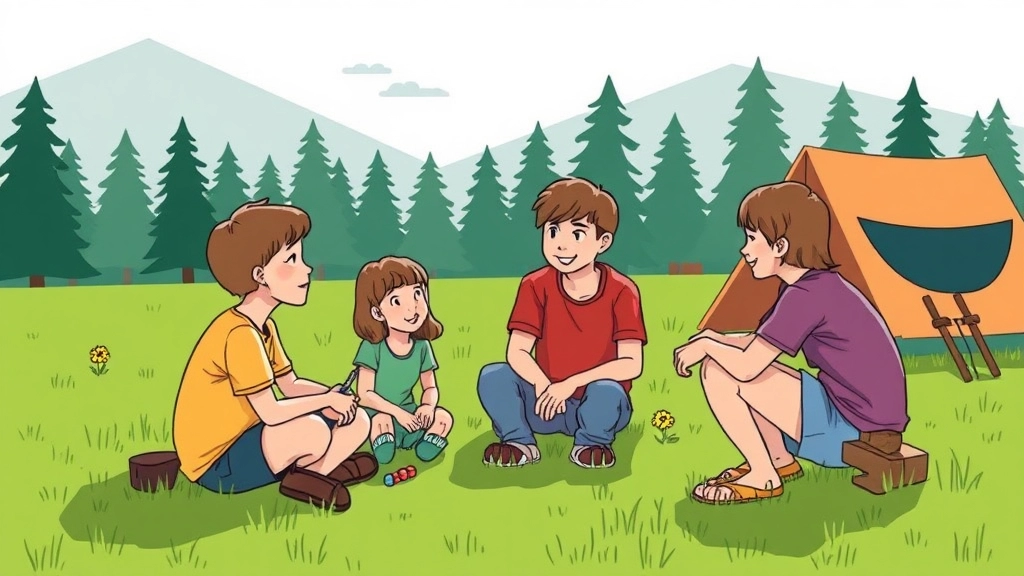
Ever wondered how your kid’s doing socially at camp?
It’s a big deal, right?
You send them off, hoping they’ll make friends and not just stare at their shoes all day.
So, how do we get to the bottom of this?
Real Questions to Ask
- Did they make new friends? This is the big one. If they’re coming home talking about a new best mate, you’re golden.
- Were they included in activities? No one wants their kid to be the odd one out.
- Did they feel supported by their peers? Camp should be a place where they feel like they belong.
What to Look For
You want to hear stories.
Did they mention having a laugh with someone?
Maybe they teamed up for a game or shared a secret handshake.
These little nuggets tell you heaps about their social life at camp.
The Power of Shared Experiences
Camp is a breeding ground for friendships.
Think about it.
You’re throwing a bunch of kids together, away from their usual cliques and comfort zones.
It’s like a social pressure cooker, but in a good way.
Tips to Gauge Social Success
- Ask about specific activities. “Who did you sit with at lunch?” or “Who was your partner in the scavenger hunt?”
- Listen for names. If they’re dropping names left and right, it means they’re connecting.
- Look for inside jokes. If they’re giggling about something you don’t get, it’s a good sign.
Stories and Examples
Remember that time I went to camp and met Tim?
We bonded over our mutual fear of the high ropes course.
By the end of the week, we were inseparable.
That’s the kind of connection you’re hoping your kid makes.
What If It Didn’t Go Well?
Not every kid comes home with a new best friend.
And that’s okay.
- Talk it out. Find out what didn’t click.
- Encourage them. Sometimes it takes a bit longer to find your tribe.
- Plan for next time. Maybe a different camp or a different approach will work better.
Collecting Suggestions for Future Improvements
Alright, let’s talk about collecting suggestions for future improvements. This is a biggie, and it’s where you get the gold nuggets that can take your camp from good to great. Trust me, the insights you get here can be game-changers.
Why Bother with Suggestions?
First off, why should you even care about suggestions? Well, here’s the thing: No camp is perfect. There’s always room to grow and evolve. Plus, who better to tell you what needs fixing than the people who’ve experienced it firsthand?
Real Concerns to Address
So, what are the real questions and worries folks have? Let’s break it down:
- Were the activities engaging enough?
- Did the food meet expectations?
- How was the cleanliness of the facilities?
- Were the staff approachable and helpful?
These are the kind of concerns your campers and their parents are thinking about. Addressing these can make or break their decision to return or recommend your camp to others.
Methods to Gather Suggestions
Now, how do you actually gather these suggestions? Here are some straightforward methods:
- Surveys: Send out a post-camp survey via email. Keep it short and sweet.
- Feedback Forms: Have feedback forms readily available during the camp.
- One-on-One Chats: Sometimes, a personal touch can uncover deeper insights.
- Suggestion Boxes: Old school but effective, especially for those who prefer anonymity.
What to Ask
When you’re asking for suggestions, be specific. Here are some questions to get you started:
- What did you enjoy the most about the camp?
- What could we improve for next year?
- How did you find the overall organisation?
- Any suggestions for new activities or programs?
Making It Easy
Here’s the kicker: Make it easy for them to give feedback. No one wants to fill out a 20-minute survey. Keep it simple, keep it quick.
- Use multiple-choice questions for quick responses.
- Include a few open-ended questions for detailed feedback.
- Allow anonymous submissions to get honest opinions.
Real-Life Example
Let me share a quick story. Last summer, we added a suggestion box at the camp entrance. One camper suggested a night-time astronomy session. We tried it out, and guess what? It became a hit! Sometimes, the best ideas come from the most unexpected places.
Acting on Feedback
Collecting suggestions is just the first step. The real magic happens when you act on them. Here’s how:
- Prioritise the most common suggestions.
- Communicate any changes or improvements to your campers and their parents.
- Keep track of what works and what doesn’t for future reference.
For more insights on enhancing your camp experience, check out our guide on summer camp culture, traditions, activities, and growth. Additionally, learn how to set up a successful canteen with our summer camp canteen setup tips.
Analyzing the Overall Impact of the Camp Experience
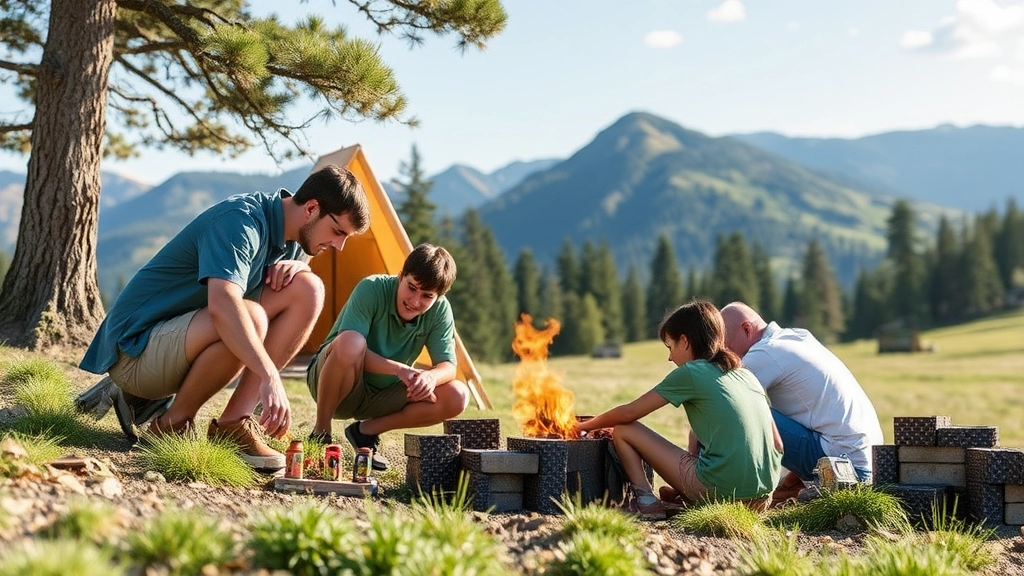
Alright, let’s talk about the overall impact of the camp experience.
You sent your kid off to camp, hoping they’d come back with more than just mosquito bites and a sunburn.
But how do you really gauge the impact?
Here’s what you need to know.
Did They Have Fun?
First off, did they have a blast?
If your kid’s talking non-stop about campfire stories and canoe races, that’s a good sign.
But fun alone isn’t the whole story.
Skills and Growth
What did they learn?
Look for growth in areas like:
- Teamwork: Did they collaborate better with others?
- Independence: Are they more self-reliant now?
- New Skills: Did they pick up any new hobbies or interests?
Social Impact
How about friendships?
Did they make new friends?
Are they keeping in touch with camp buddies?
Social skills are a huge part of the camp experience.
Emotional Well-being
Check in on their emotional state.
Did they come back happier, more confident, or more resilient?
Sometimes, camp can be a real boost for a kid’s self-esteem.
Real-life Examples
Take my mate’s kid, for example.
He went to camp shy and introverted.
Came back a chatterbox with a bunch of new mates and a newfound love for archery.
That’s the kind of impact we’re talking about.
Feedback from Campers
Get direct feedback.
Ask your kid specific questions like:
- What was your favourite part of camp?
- What did you learn?
- Would you want to go back?
Their answers can be eye-opening.
Parent Observations
Don’t forget your own observations.
Have you noticed any changes in their behaviour or attitude?
Sometimes, the impact is more evident to us than to them.
Identifying Areas for Staff Training and Development
Alright, let’s get into this. When it comes to camp experiences, one of the biggest concerns for both parents and campers is the quality of staff. Are they trained well? Do they know how to handle different situations? How can we make sure they’re the best they can be? These are the real questions we need to tackle.
Why Staff Training Matters
First off, staff training isn’t just a box to tick off. It’s the backbone of a great camp experience. Think about it: the staff are the ones interacting with the campers day in and day out. They set the tone. If they’re not up to par, the whole camp vibe can take a nosedive. For insights on creating a positive camp culture, explore summer camp culture, traditions, and activities.
Key Areas for Training
So, what specific areas should we focus on for staff training and development? Here are some big ones:
- Safety Protocols: This is non-negotiable. Staff need to know how to keep campers safe, from first aid to emergency procedures.
- Conflict Resolution: Kids will be kids. Disagreements happen. Staff should be pros at defusing situations before they escalate.
- Activity Leadership: Whether it’s leading a hike or a craft session, staff should be confident and engaging.
- Inclusivity and Sensitivity: Camps are diverse. Staff need to be trained in cultural sensitivity and inclusivity to make everyone feel welcome. Check out our STEMGem Summer Camp for an inclusive and engaging learning experience.
Real-Life Examples
Let me share a quick story. Last summer, we had a new counsellor, Sarah, who was fantastic with the kids. But when it came to handling conflicts, she struggled. After a few sessions on conflict resolution, she became one of our best at managing tricky situations. The campers noticed the difference, and so did their parents.
Continuous Development
Training shouldn’t be a one-and-done deal. Continuous development is key. Here’s how we can keep the momentum going:
- Regular Workshops: Monthly or bi-monthly workshops can keep skills fresh.
- Feedback Loops: Encourage campers and other staff to give feedback. Use this to identify areas that need more focus.
- Mentorship Programs: Pair new staff with seasoned veterans. Real-world experience is invaluable.
Measuring Success
How do we know if our training is hitting the mark? Simple. We measure it. Look at:
- Camper Feedback: Are campers happy and engaged? Their feedback is gold.
- Incident Reports: Fewer incidents mean the training is working.
- Staff Retention: Happy, well-trained staff are more likely to stick around.
Gauging Interest in Returning or Recommending the Camp
So, you’re wondering if campers are keen to come back, right?
And, of course, if they’d recommend the camp to their mates.
Why is this important?
Because it tells you a lot about how well you’re doing.
If kids are buzzing to return, you’re onto something good.
If they’re not, well, you’ve got some work to do.
Here’s how to gauge that interest:
- Ask Directly:
- Would you come back next year?
- Would you tell your friends about this camp?
- Look for Enthusiasm:
- Are they talking about camp non-stop?
- Do they seem genuinely excited when they talk about their experience?
- Feedback Forms:
- Use simple, straightforward questions.
- Keep them short and sweet.
- Talk to Parents:
- What did your child say about the camp?
- Would you consider sending them again?
Real-Life Example:
Imagine this â you’ve got a camper named Jake.
Jake can’t stop raving about the campfire stories and the epic canoe races.
He’s already planning next summer’s trip.
That’s a big win.
What if the feedback isn’t great?
That’s okay.
It’s a chance to improve.
Pro Tips:
- Follow-Up: Send a quick email after camp asking for feedback.
- Incentives: Offer a discount for early sign-ups.
- Surveys: Keep them fun and engaging.
Remember:
If kids and parents are happy, they’ll spread the word.
And that’s the best marketing you can get.
For more tips on improving your camp, check out our summer camp activities guide and learn how to create a memorable experience.
Also, discover how to keep your campers safe and engaged with our teen summer camps safety tips.
FAQs on End of Summer Camp Survey Questions
What are the key areas to evaluate in camp activities and programs?
When evaluating camp activities and programs, consider the following key areas:
- Engagement: Are the activities engaging and fun for the kids?
- Variety: Is there a diverse range of activities such as sports, arts, and adventure?
- Skill-building: Do the activities offer opportunities for learning and development?
- Age-appropriateness: Are the activities suitable for different age groups and skill levels?
- Frequency and Duration: How often do activities occur, and are they long enough to be engaging?
- Feedback: Are there mechanisms to gather feedback from campers?
Why is it important to gather feedback on camp staff and leadership?
Feedback on camp staff and leadership is crucial because they set the tone for the entire camp experience. Their approachability, knowledge, and ability to handle emergencies impact the overall safety and enjoyment of the camp.
What are effective methods to gather feedback from campers?
Effective methods to gather feedback include:
- Surveys: Quick and easy, can be done online or on paper.
- One-on-One Chats: Personal conversations to gather in-depth feedback.
- Group Discussions: Facilitated discussions with multiple campers.
- Anonymous Feedback: Allows campers to share their thoughts without revealing their identity.
How can I assess my child’s social interactions and friendships at camp?
To assess social interactions and friendships, ask specific questions such as:
- Did they make new friends?
- Were they included in activities?
- Did they feel supported by their peers?
Look for stories, names of friends, and inside jokes as indicators of social success.
What should I do if my child didn’t have a positive social experience at camp?
If your child didn’t have a positive social experience, consider the following steps:
- Talk it out: Understand what didn’t work for them.
- Encourage them: Remind them that finding friends can take time.
- Plan for next time: Consider a different camp or approach for the future.
How can I gauge the overall impact of the camp experience on my child?
To gauge the overall impact, consider the following aspects:
- Fun: Did they enjoy themselves and have memorable experiences?
- Skills and Growth: Did they learn new skills, become more independent, or improve teamwork?
- Social Impact: Did they make new friends and improve their social skills?
- Emotional Well-being: Did they come back happier, more confident, or more resilient?
What types of questions should I ask my child to get direct feedback about their camp experience?
Ask specific questions such as:
- What was your favourite part of camp?
- What did you learn?
- Would you want to go back?
Their answers can provide valuable insights into their overall experience.
Why is it important to keep feedback ongoing?
Ongoing feedback helps in continuously improving the camp experience. Regular check-ins, suggestion boxes, and follow-up sessions ensure that the camp evolves and addresses any recurring issues or areas for improvement.
References
-
The Importance of Camp Activities
-
How Camp Benefits Kids
-
The Benefits of Summer Camp

